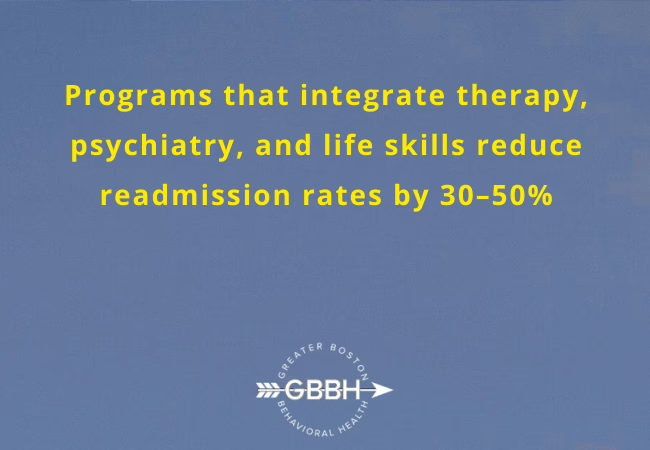Many people begin mental health treatment during a crisis. But true recovery is not about short-term symptom relief—it’s about building long-term emotional resilience, functional independence, and a sense of control over your life. That’s why short-term therapy or medication alone is often not enough.
Comprehensive mental health programs, like those at Greater Boston Behavioral Health, offer a multi-phase, multidisciplinary approach that supports individuals from crisis to recovery—and beyond.
Whether you’re facing anxiety, depression, trauma, substance use, emotional dysregulation, or dual diagnosis concerns, our mental health programs in Massachusetts are designed to meet your needs at every level, from stabilization to reintegration into daily life.
What Does “Comprehensive Mental Health Care” Really Mean?
A comprehensive mental health program integrates:
- Multiple levels of care based on clinical need
- Holistic support including therapy, psychiatry, family involvement, and life skills training
- Personalized treatment plans that evolve with you
- Support systems that continue after discharge
At Greater Boston Behavioral Health, we offer:
- Inpatient Treatment Program in Massachusetts
- Residential Treatment Program in Massachusetts
- Partial Hospitalization Program in Massachusetts
- Intensive Outpatient Program in Massachusetts
- Outpatient Counseling and Psychiatric Services
- Anger Management Therapy in Massachusetts
- Relapse prevention and aftercare coordination
Together, these services provide a continuum of care that adjusts as clients gain strength, stability, and confidence.
Why a Continuum of Care Is Essential for Stability
Mental health doesn’t operate on a one-size-fits-all model. Some people begin at the highest level of care (inpatient or residential), while others start in outpatient therapy. What matters is not just where you start—but how you progress.
How the Continuum Works:
- Crisis or hospitalization → Inpatient treatment
- Daily structured care → Partial hospitalization (PHP)
- Return to daily life with support → Intensive outpatient program (IOP)
- Maintenance and independence → Outpatient therapy and psychiatric care
- Long-term recovery → Alumni support, peer groups, and relapse prevention
This progression allows for gradual, supportive transitions that reduce stress and relapse, while increasing empowerment and autonomy.
The Role of Each Program in Long-Term Mental Health Success
1. Inpatient Treatment Program in Massachusetts
This is the highest level of care, typically provided in a hospital or locked unit.
Best for:
- Suicidal ideation or attempts
- Psychosis, mania, or hallucinations
- Severe withdrawal or detox needs
- Risk of harm to self or others
Goals:
- Stabilize critical symptoms
- Provide a safe, controlled environment
- Begin medication or rapid intervention therapy
- Transition into PHP for ongoing care
Inpatient treatment is about survival and safety—and it’s the critical first step toward long-term wellness.
2. Residential Treatment Program in Massachusetts
A non-hospital, live-in setting offering daily structure and therapy for several weeks or months.
Best for:
- Dual diagnosis (substance use + mental health)
- Repeated relapses or failed outpatient attempts
- Trauma recovery in a secure environment
- Emotional dysregulation or high-risk behaviors
Services include:
- Daily therapy (CBT, DBT, trauma-informed)
- Group work, peer support, and life skills
- Holistic offerings: yoga, nutrition, mindfulness
- Planning for reentry into community or step-down care
This setting fosters emotional safety, stability, and routine, allowing individuals to focus on healing without external distractions.
3. Partial Hospitalization Program in Massachusetts
Clients live at home (or in supportive housing) and attend structured programming during the day.
Structure:
- 5 days per week
- 5–6 hours per day
- Individual therapy, group therapy, psychiatric management
Best for:
- Stepping down from inpatient or residential care
- Avoiding inpatient hospitalization during worsening symptoms
- Managing mood disorders, trauma, or intense anxiety/depression
PHP offers intensive support while reintroducing life responsibilities, like cooking, commuting, or self-care.
4. Intensive Outpatient Program in Massachusetts
Designed for those who need consistent support but are ready to return to work, school, or parenting responsibilities.
Structure:
- 3–5 days per week
- 3–4 hours per day
- Group therapy, individual therapy, psychiatry, and skills work
Common Focus Areas:
- Depression and anxiety
- Relapse prevention
- Emotional regulation (especially through anger management therapy in Massachusetts)
- Transition planning
IOP helps clients apply learned coping skills in their daily lives while staying accountable and connected to care.
5. Outpatient Counseling and Psychiatric Care
Once stabilized, clients may step into traditional outpatient therapy for long-term maintenance.
Services include:
- Weekly or biweekly therapy
- Medication management
- Family or couples therapy
- Check-ins on goals, symptoms, and wellness planning
This level of care is ideal for managing symptoms and staying on track long after formal treatment ends.

How Comprehensive Care Builds Lasting Stability
1. Holistic Focus on Mind, Body, and Environment
Stability isn’t just about managing thoughts—it’s about supporting the whole person:
- Physical health (nutrition, sleep, exercise)
- Emotional insight and self-regulation
- Safe housing and supportive environments
- Purpose and goal setting
- Positive relationships and community
We integrate all these dimensions into our treatment approach.
2. Personalized Care Plans that Evolve with You
Each client’s journey is different. We assess and adapt your care plan based on:
- Progress made
- New life circumstances
- Updated goals
- Changes in diagnosis or medication
This responsiveness keeps you engaged and empowered throughout your treatment.
3. Evidence-Based Therapies with Real-World Impact
We use proven methods like:
- CBT (Cognitive Behavioral Therapy)
- DBT (Dialectical Behavior Therapy)
- Trauma-Informed Therapy
- Motivational Interviewing
- Anger Management Therapy in Massachusetts
These therapies reduce symptoms and teach practical tools for navigating everyday challenges.
4. Strong Therapeutic and Peer Support Networks
In PHP, IOP, and group therapy settings, you build:
- Emotional connection
- Mutual accountability
- Skills in conflict resolution and vulnerability
- Confidence in your ability to be supported—and support others
This reduces isolation and enhances long-term recovery.
5. Structured Transitions That Prevent Setbacks
Clients who skip levels of care or leave abruptly are more likely to:
- Relapse
- Drop out of treatment
- Return to crisis care
Comprehensive programs ensure gradual transitions, so each step prepares you for the next—without losing progress.
Why Greater Boston Behavioral Health?
As a trusted mental health treatment center in Massachusetts, we offer:
- A full continuum: inpatient, residential, PHP, IOP, outpatient
- Licensed experts in therapy, psychiatry, trauma, and dual diagnosis
- Compassionate care that treats the person—not just the diagnosis
- Inclusive services tailored to age, gender, culture, and identity
- Specialty tracks like anger management therapy in Massachusetts
Whether you need stabilization or long-term support, our team is ready to walk the path with you.
Conclusion
True mental health recovery isn’t about checking a box or completing a single program—it’s about building a foundation for lifelong stability. At Greater Boston Behavioral Health, we understand that each person’s path is different, which is why we offer a full continuum of care that meets you where you are and grows with you.
Whether you need intensive stabilization, day-to-day structure, emotional skill-building, or support reintegrating into daily life, our comprehensive mental health programs in Massachusetts are here to guide you at every step. From partial hospitalization and IOP to anger management therapy, outpatient care, and beyond, we’re committed to helping you build lasting strength—not just short-term relief. Call us today at 888.278.0716 to schedule a confidential assessment. Let’s work together to turn recovery into a stable, empowered, and fulfilling future.
FAQ on Mental Health Care and Long-Term Stability
What does “comprehensive mental health care” mean?
It refers to a full spectrum of treatment options that address all aspects of recovery—from inpatient stabilization and residential support to outpatient therapy, psychiatry, and specialty tracks like anger management therapy in Massachusetts. This approach allows care to evolve with the individual’s needs over time.
Why is a continuum of care important in mental health recovery?
A continuum of care ensures that clients receive the right level of support at each stage of healing. Starting with inpatient or PHP, then moving to IOP and outpatient therapy, this structure minimizes relapse and promotes long-term emotional resilience and independence.
What mental health programs are available at Greater Boston Behavioral Health?
We offer a wide range of services including:
-
Inpatient treatment programs in Massachusetts
-
Residential treatment programs
-
Partial Hospitalization Program (PHP)
-
Intensive Outpatient Program (IOP)
-
Outpatient therapy and psychiatric care
-
Specialty tracks like anger management therapy in Massachusetts
Can I customize my mental health treatment plan?
Absolutely. Our clinical team tailors every care plan to meet the individual’s specific diagnoses, goals, strengths, and preferences—whether you need trauma-informed therapy, dual diagnosis treatment, or behavioral support.
How does comprehensive care improve long-term outcomes?
By providing step-down support, evidence-based therapies, skill-building, and aftercare planning, comprehensive care helps clients achieve lasting recovery. Research shows it reduces relapse risk, boosts engagement, and leads to stronger outcomes than single-level care.

